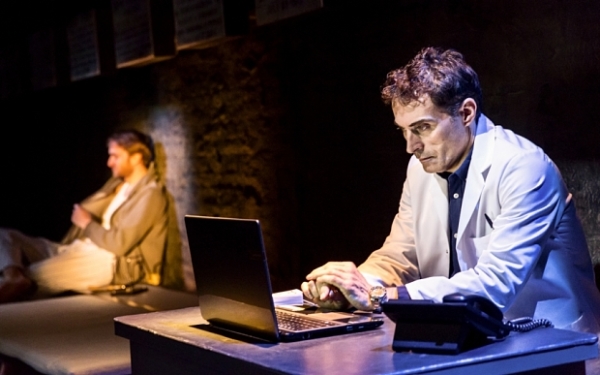Closer (Donmar Warehouse) – 'red-blooded revival'

© Johan Persson
It was the internet's stage debut. In 1997, two men sat at computers on opposite sides of the Cottesloe stage, and had cyber-sex – one of them masquerading as a woman: "dark hair, dirty mouth, epic tits."
Closer, the third play by Patrick Marber, suggested a new age had arrived; one in which identity was malleable, sex was everywhere and love – ha – was just another consumer choice. Tinder was still 15 years away; even Facebook, seven. But why settle down when millions of strangers remain unfucked? Why settle for yourself when you could be anyone you want?
Closer is a fin de siècle play, entirely preoccupied with death. Its four Londoners are aghast at the prospect of aging. They could be the start of a bad joke: a dermatologist, an obituarist, a photographer and a stripper walk into a play. All of them circling around death, around sex, around surface appearances; circling around each other. They're seeking perfection. Happiness. Paradise on earth, in London – "a theme park," says one.
The four of them form two couples: Dan, obituarist, and Alice, stripper, meet at a car accident; Larry, doctor, and Anna, photographer, meet by the shark tank at London's new aquarium. Over four years, they swap – or steal – partners, then swap – or steal – them back; always wanting what they haven't got. Love becomes a battleground. "Have you ever seen a human heart?" spits Larry at Dan. "It's like a fist wrapped in blood."
That comes to the fore in David Leveaux's red-blooded revival, as two lascivious alpha males lock horns. Both are bundles of insecurity. Rufus Sewell, so drawn he's practically a skin-covered skull, is twitchy and snarling as Larry. Oliver Chris's Dan is a wet blanket hiding beneath a nasty, dry wit. Alice and Anna are territory to be fought over or property to be possessed, but Leveaux lets them off the hook in a way Marber never does.
The women are pretty much beatified here, almost entirely blameless – and it's a problem. Rachel Redford's Alice is first seen in a shaggy white coat – a lamb to Daniel Wolf's slaughter – while Nancy Carroll's Anna, older and exhausted, wears her meshed jumper like chain mail. Marber makes them equal partners in the plot, pulling the strings and exploiting the men: Alice strips, Anna cheats and both plot their partner swaps. Leveaux makes them somehow more acquiescent and so reduces their agency. We get two villains and two victims, not four people, all brittle and vicious and trying.
That's symptomatic of a production that's always too simple and often too stewed. It settles down eventually, but Leveaux's levels are off; the acting's too big for the Donmar. Sewell's borderline maniacal and Chris sighs off into middle-distance. At one point, Redford leaves a room and looks back, longingly, over her shoulder. It verges on soap – and neither Bunny Christie's hollow industrial-chic set nor sloppy, slushy Finn Ross projections help matters.
Marber's writing is never that. It's insistent, true, with death woven into almost every other line, but Closer's as well-made as a watch, stringent in its plotting and strident in its politics. Psychologically, it's extraordinary – both bruised and bruising – and well, well ahead of its time.
Closer runs at the Donmar Warehouse until 4 April 2015










